Attention Butthurt Blue Belts: The Truth About Sandbagging In Jiu-Jitsu
Attention Butthurt Blue Belts: The Truth About Sandbagging In Jiu-Jitsu
One of the many excuses that people love to explain a crushing defeat is the presence of a “sandbagger” in their division.
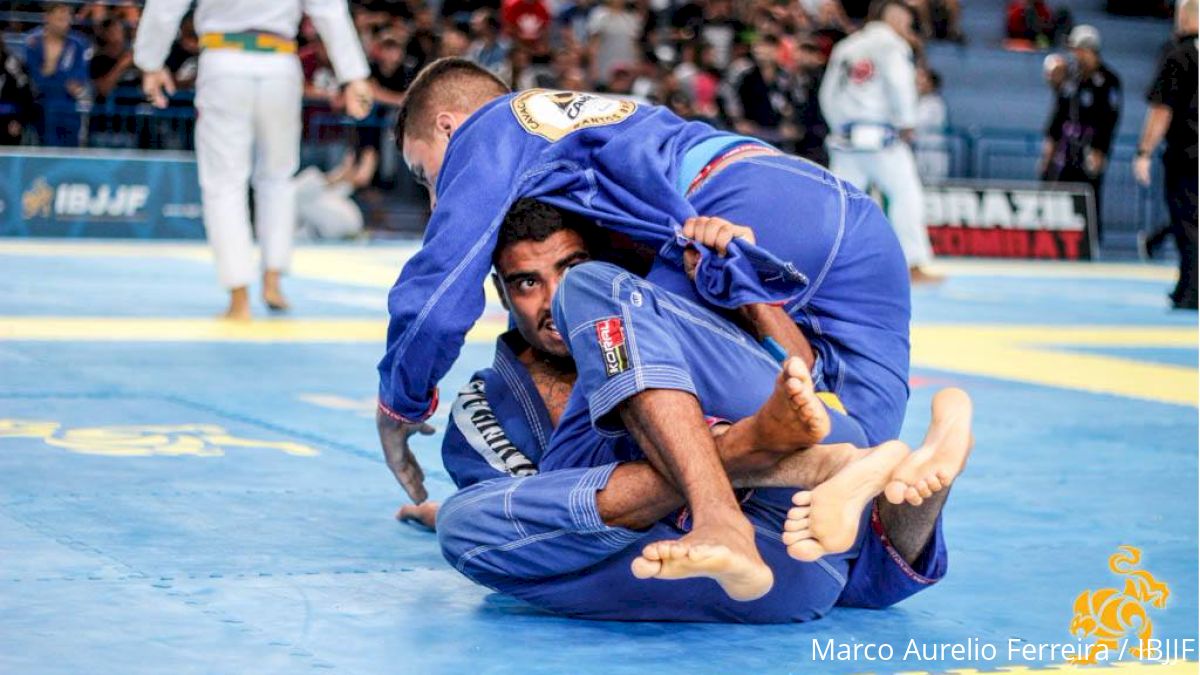
By Josh Hinger
One of a great many excuses competitors and coaches commonly employ to explain a crushing defeat during a jiu-jitsu match is the presence of a “sandbagger” in the division.
In relation to jiu-jitsu competition, it is commonly stated that some competitors are staying at lower belt levels too long in order to achieve multiple major tournament victories before moving to the next belt level.
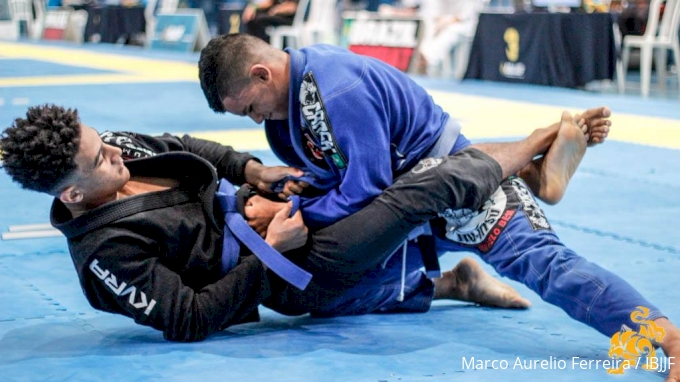
Brazilians who have trained from a young age are frequently accused of being sandbaggers. Photo: Marco Aurelio Fereira / Arena Jiu-Jitsu / IBJJF
But this isn’t really sandbagging. All competitors are entitled to spend 1 1/2 to 3 years at any given belt level before moving to the next category. Also, it is the athlete’s professor who decides when to promote their student, not the student themselves.
Belt promotions are a complicated and requirements vary widely from academy to academy. Lastly, does it really matter that much? The ultimate goal for competitors is to win at black belt, and at black belt, there is no sandbagging.
True sandbagging is less common than you may think. Holding someone back from a belt promotion is not sandbagging. Sure, it’s difficult to explain why some jiu-jitsu matches can play out in such imbalanced fashion, but not all competitors are created equally. I think to accuse a victorious competitor of unethical behavior, such as sandbagging, is not an appropriate or classy way to manage a loss.
In my opinion, statements about sandbaggers are cheap and meaningless, and they really reflect an insecurity about one’s own skill level or the skill level of their student-athlete. I think it is really unfortunate when an athlete blames their loss on the other competitor, particularly when referring to a type of unethical behavior such as sandbagging. I cannot even fathom complaining about someone beating me in a tournament because they were “too skillful.”
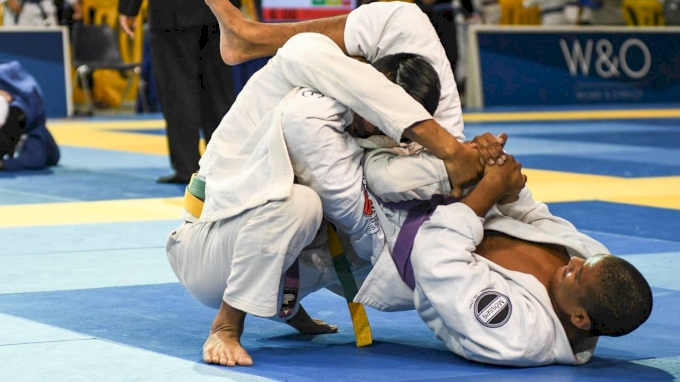
Photo: Chase Smith
Sandbagging is more accurately represented by a situation in which a competitor who is established at one skill level then decides to enter a competition at a lower level for the sake of seeking an easy victory. For example, if someone competes for the IBJJF at brown belt and then they enter the UAEJJF World Pro at purple belt so that they can win the cash prize—THAT is a sandbagger. The two organizations do not cross-check the skill levels of their tournament registrants and therefore would never know if sandbagging was happening.
Due to the small nature of the jiu-jitsu competition community, and the very large obsession that athletes have with social media, sandbagging is a very difficult thing to do. If someone was to enter a division lower than that of their current skill rank, it would probably be spotted quickly and that individual would be subjected to intense public shaming and ridicule and would likely be banned from competing for the organization in which the competitor was caught cheating.
Note the word cheating.
Sandbagging is cheating. Holding someone at a certain belt level or skill level for an extended period of time is not cheating.
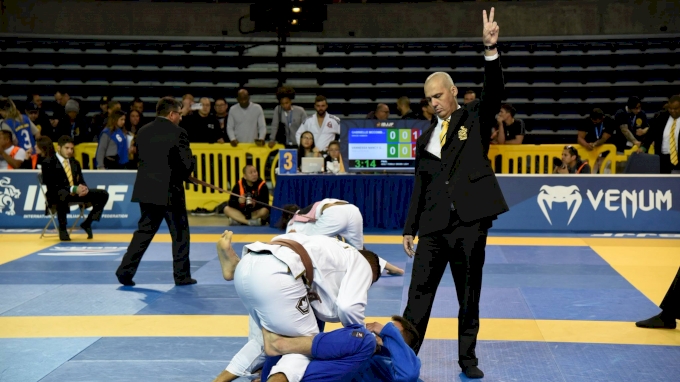
Photo: Chase Smith
There are many reasons why a coach or professor would choose to hold an athlete at a specific level for an extended period of time. There are far more variables that go into the consideration for a belt promotion than just how well the athlete performs at competitions. And quite frankly, it is no one else’s business as to why an athlete has not been promoted by their coach or professor.
Just because a competitor may have mastered two or three moves that they use to slay entire tournament divisions does not necessarily mean they are ready to be promoted to the next level.
When it comes to belt promotions, professors usually take a wide variety of factors into consideration, including but not limited to...
- An athlete’s general attitude in the training room
- Their character
- Their effort and dedication to training
- Their ability to teach or communicate technical jiu-jitsu information
- Their ability to lead by example, their level of maturity
- Their general understanding of a specific technical curriculum
- Their willingness to help others
- Their level of sportsmanship and jiu-jitsu etiquette
All jiu-jitsu professors and coaches have standards that they expect their athletes to meet before they are recognized with a new belt promotion, and I strongly believe that for most professors tournament performance is not the most important factor to consider.
While I have no intention to speak for all jiu-jitsu professors, I would be willing to assume that most care very little about tournament performance. I think most professors are very proud of their students who make the effort to step out of their comfort zones and test themselves against other competitors of similar skill levels—and that’s that. Promotions are not based on tournament performance, and therefore winning a tournament does not create a promotion obligation.
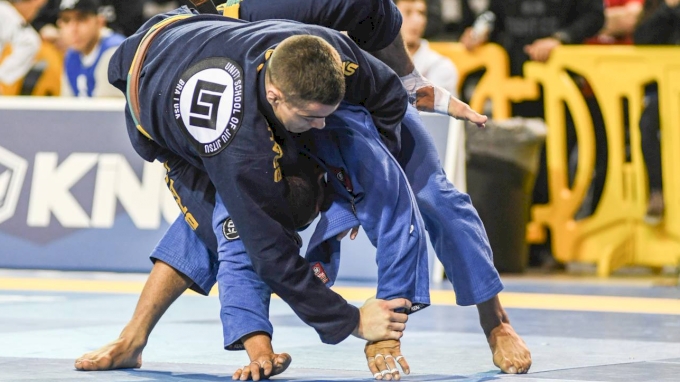
Photo: Chase Smith
It is ridiculous and shameful for the professor of a defeated opponent to declare that the winning athlete is a sandbagger. First of all, the athlete is not in charge of their own belt promotions. It is completely out of their hands. Secondly, it is the most pitiful of excuses for a loss. It’s OK to simply state that the other athlete was the better competitor on that day. To refer to someone as a sandbagger is like accusing someone of working too hard.
If someone dedicates their life to training jiu-jitsu and becomes a full-time competitor, then it is very likely that they will have very dominant performances in all of their divisions.
I know many blue belt competitors who gave up their pre-jiu-jitsu lives to train and compete in jiu-jitsu full-time. They work extremely hard from morning to night with great focus and intention. Personally, I would expect any blue or purple belt IBJJF Worlds podium finisher to defeat a non-competitor black belt in a competitive match. Why do I say this? Because I had that experience firsthand when I arrived at Atos HQ in the summer of 2014. I thought I was a decently skilled non-competitor black belt (promoted by Professor Andre Galvao himself) and I got absolutely obliterated by the blue and purple belts in my first evening class at the academy.
It was an eye-opening and humbling experience. But I can tell you what the first thought in my mind wasn’t… I didn’t think “these guys are sandbaggers.” No. Instead, I owned the ass-whooping that I took and I told myself that it’s time to step it up.
So, how much time and success at one belt level is too much? In my opinion, the answer is two IBJJF world titles. After two world titles, there’s not much more for a person to prove at their given rank. But as I mentioned before, belt promotions have more to do with attitude, character, and interpersonal development than with tournament performances.
All photos in this article used for illustrative purposes only
Josh Hinger is an IBJJF black belt no-gi world champion representing Atos Jiu-Jitsu. Follow him on Instagram and Facebook.
Liked this article? You may also enjoy...
- Why Rickson Gracie's Views On Sport Jiu-Jitsu And Self-Defense Are Outdated
- A Question Of Age: An Over 30s Perspective On Adult vs. Masters Divisions
- In Defense Of Jiu-Jitsu's Most Hated Rule: The Pros And Cons Of Advantages
- How To Manage Your Mind On Tournament Day
- The Brutal, Painful Reality Of Training In A World-Class Jiu-Jitsu Gym
- Beware Of The False Champions With Medals They Don't Deserve
- Are Closeouts Good Or Bad For The Sport?